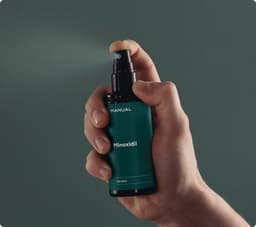Minoxidil is available in two forms: as a topical solution (spray or foam) that you apply directly to your scalp, or as an oral tablet. The tablet form is licensed for treating high blood pressure, though it's sometimes prescribed off-label for hair loss. In this article, we're focusing on topical minoxidil, which you apply directly to areas of hair loss.
Topical minoxidil is pretty straightforward to use. Still, there are steps you need to follow and a few things to bear in mind. Here's how to use minoxidil for hair loss.
Key Takeaways
- Minoxidil 5% spray and foam are applied twice daily, while 10% spray is applied once daily
- Apply directly to clean, dry scalp and wait at least 4 hours before getting it wet
- Leave at least 12 hours between doses for twice-daily applications
- Results typically take 6 months to notice and around a year for peak effects
- Consistency is key—apply minoxidil every day as directed

How to apply minoxidil spray (topical solution)
First, let’s look at minoxidil spray. Here’s how to use it:
- Make sure your scalp is clean, dry and healthy.
- Wash your hands with soap and water, ensure they’re completely dry.
- Part your hair to expose the affected areas of your scalp.
- Spray minoxidil onto those areas. The 5% strength is applied twice daily (morning and evening, leaving at least 12 hours between doses), while the 10% strength is applied once daily.
- You may have to press the spray nozzle multiple times. At MANUAL, both strengths use 7 sprays per application, but check with your provider for specific instructions.
- Wash and dry your hands again.
That’s it, you’re done! That’s how to apply minoxidil spray.
Note: The 10% minoxidil strength is used off-label for hair loss but is available through MANUAL for patients who may benefit from a higher concentration with less frequent dosing.
How to apply minoxidil foam
Minoxidil foam is also available for hair loss, though it's not offered at MANUAL. If you're using foam from another provider, follow these steps:
1. Ensure that your scalp is clean, dry and healthy
2. Wash and dry your hands. Make sure your hands aren’t too warm to touch—if so, the foam might melt. If that’s you, run your fingers under cold water (and dry thoroughly) before applying minoxidil
3. Part your hair to expose the affected areas of your scalp
4. Open the container, hold the can upside down and press the nozzle to dispense half a capful of foam (1g) onto your fingers.
5. Gently massage the foam into the affected areas of your scalp. Apply the foam twice per day, leaving 12 hours in between each dose
6. Wash and dry your hands after application
How often to use minoxidil
How often you apply minoxidil depends on the strength:
The recommended doses are:
- Minoxidil 5% spray: 1ml solution twice daily
- Minoxidil 10% spray: 1ml solution once daily
- Minoxidil foam: 1g foam twice daily
And here’s a refresher on how much minoxidil to use:
- Minoxidil spray: your provider will confirm the exact dosage for your specific product. At MANUAL, both the 5% and 10% spray strengths use 7 sprays per application to deliver the correct 1ml dose.
- Minoxidil foam: for each dose, use half a capful of foam which is equivalent to 1g.
How long are you supposed to leave minoxidil in your hair?
After applying, leave minoxidil in your hair for at least four hours. Don’t get your scalp wet before then as you might wash off the medicine.
This is so that minoxidil has enough time to properly absorb into your skin.
When to shampoo after minoxidil
Good news: there’s no need to change your hair care routine while using minoxidil. You can use shampoo as normal and wash your hair as often as you usually would.
Though because minoxidil can build up on the hair and scalp, washing your hair every day or every second day might help keep it fresh and healthy.
And just to remind you: wait at least four hours after using minoxidil before showering.
How to use minoxidil for your beard
Minoxidil is licensed for scalp hair loss, but some men use it off-label to help with beard growth. And studies suggest that it works.
If prescribed by your provider, there's no official guidance on application for beard growth, but following general principles:
- Apply to clean, healthy, and dry skin.
- Wash hands before and after use.
- Spread the medicine over the area with your fingertips.
- Apply twice per day if using 5% strength, once daily if using 10%
- Don’t get your beard wet for at least four hours.
- Leave at least 12 hours between doses (for 5% strength).
For a deeper look at how minoxidil is used for beard growth and what the research shows, see our guide on minoxidil for beard growth.
Top tips for using minoxidil
Want to maximise your results on minoxidil? Try these tips:
- Be consistent. Apply minoxidil as directed, every day.
- Allow the solution to dry for at least 20 mins before applying any hair styling products, or going to bed.
- Be patient. It takes about six months to notice changes on minoxidil—and around a year for peak results. See how long minoxidil takes to work for a full timeline.
- If you forget to use minoxidil, don’t take extra to “make up” for the missed dose. Just take your next dose as normal.
- Don’t use more minoxidil than recommended. You won’t get better results and you’ll have a higher chance of side effects.
- If you use too much minoxidil, get in touch with your provider.
- If you find it too oily, ensure you use it on clean hair and you can also gently use a hairdryer
Get your confidence back
You don’t have to sit back and watch hair loss happen. At MANUAL, our team of clinicians can put together a personalised, scientifically-backed plan to get your hair back.
Take our quiz to get started.





